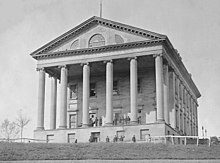James M. French
French read law and was admitted to the bar in Wise County, Virginia, before the American Civil War.
[3] During the American Civil War, French and his brother Joseph enlisted in the 51st Virginia Infantry at Abingdon on July 16, 1861, along with Augustus Henderson and others from Wise County.
Joseph S. French remained a private in the Confederate States Army and received a medical discharge a month later, as would many members of the unit by winter (which lost far more men due to exposure, poor diet and the camp diseases of pneumonia, dysentery, typhoid fever and measles than in combat; Joseph S. French would then re-enlist in his brother's 63rd Virginia in Chattanooga in November 1863 but had baggage duty and went home the following February).
Gen. Gabriel C. Wharton and Lt. Col. James Woods Massie both VMI professors, and George Alfred Cunningham, tried to defend the Kanawha Valley, but by fall lost the Battle of Carnifex Ferry (which led to the creation of the state of West Virginia).
By January 2, 1862, the remainder of the 51st Virginia and other units traveled by railroad to Bowling Green, Kentucky, where they took steamboats to assist the defense of Nashville, Tennessee.
[5] He received a commission as major (under Col. James J. McMahon, a Presbyterian minister who had previously served under Gen. Floyd).
The 63rd Virginia trained at Camp Narrows near Pearisburg during the summer of 1862 and on September 12, 1862, scored their first victory, a skirmish at Montgomery Ferry in the Charleston Campaign, but withdrew from the Kanawha valley again, because reinforcements were needed after the Battle of Antietem in October 1862, and these troops were likely returned to Giles County to guard the narrows of the New River and Saltville, Virginia.
They camped and fought that winter in Southampton County, Virginia, and northeastern North Carolina, although Col. French was away recruiting much of the time.
[6] On April 15, 1863, Col. John Dils (1818–1895) and the Unionist 39th Kentucky home guard captured Col. French, together with his company surgeon, 14 officers and 70 men near Shelby Fork and Pikeville in eastern Kentucky, where they were attempting to recruit the 65th Virginia regiment (as well as dissuading Confederate sympathizers from enrolling in Col. Nathaniel C. Menifee's regiment, which had raided Pikeville and also engaged in atrocities).
[7] However, Confederate forces were then defeated at the Battle of Missionary Ridge on November 25, 1863, and the unit's provisioning and disease problems worsened that winter.
He was taken prisoner a second time on December 5, 1864, near La Vergne, Tennessee, during the Franklin-Nashville Campaign and again sent to Camp Chase on April 11, 1865, where he was paroled on July 25, 1865.
